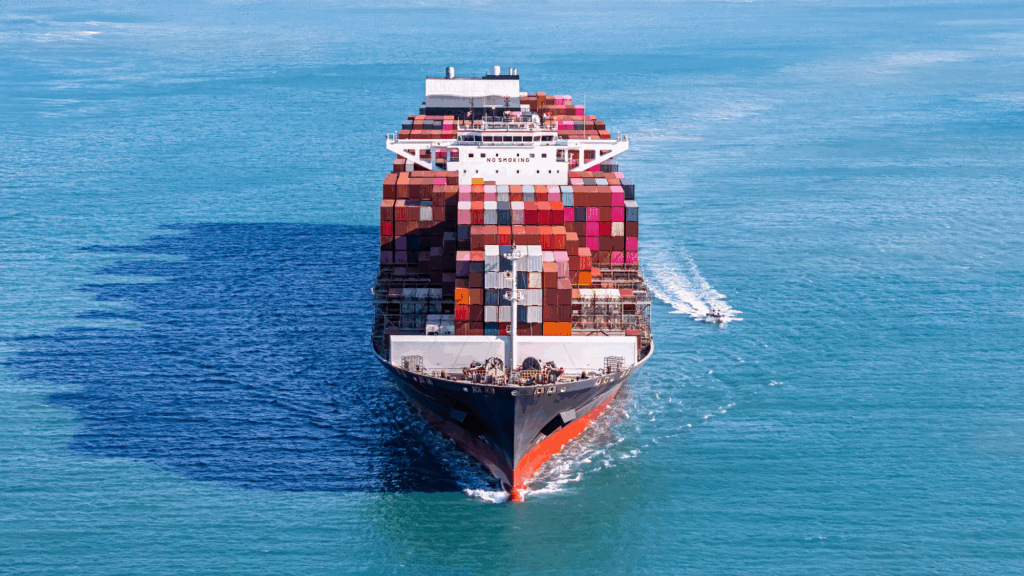- By Della tj
- September 23, 2025
- Sea Freight, Shipping
How long does sea freight take from China to USA is one of the most frequent questions asked by importers planning shipments. Delivery schedules vary due to port congestion, customs clearance, weather, and chosen shipping service, but with careful planning, businesses can ensure cost-effective and reliable supply chains.
What Factors Affect Sea Freight Transit Time from China to USA?
Several elements influence transit time:
- Origin port and destination port selection
- Shipping line schedules and vessel speed
- Customs clearance delays
- Peak season congestion
- Incoterms and documentation accuracy
Moreover, external issues like typhoons or labor strikes may also extend delivery schedules.
How Long Does Sea Freight Take from Major Chinese Ports to USA?
| Origin Port | Destination (West Coast) | Transit Time | Destination (East Coast) | Transit Time |
|---|---|---|---|---|
| Shanghai | Los Angeles/Long Beach | 14–18 days | New York/New Jersey | 28–35 days |
| Shenzhen (Yantian) | Los Angeles/Long Beach | 15–20 days | Savannah | 30–36 days |
| Ningbo | Oakland | 16–21 days | Miami | 32–38 days |
| Qingdao | Seattle | 18–23 days | Charleston | 29–34 days2 |
Accordingly, shipments to the U.S. West Coast are much faster compared to East Coast routes.
How Do Shipping Methods Impact Time and Cost?
| Mode | Average Cost (40HQ) | Transit Time | Pros | Cons |
|---|---|---|---|---|
| Standard FCL | $2,000–$2,700 | 14–35 days | Cost-efficient | Slower |
| LCL (consolidated) | $35–$60/CBM | 18–40 days | Cheaper for small loads | Delays due to consolidation |
| Expedited Service | $3,200–$3,800 | 12–22 days | Faster transit | More expensive |
In addition, forwarders may combine sea-air solutions for time-sensitive shipments.
Real Case Studies of Sea Freight from China to USA
Case 1:
- Route: Ningbo → Los Angeles
- Cargo: 1×40HQ, toys
- Mode: FCL
- Cost: $2,350
- Transit Time: 16 days
- Outcome: Retailer met holiday season demand.
Case 2:
- Route: Shenzhen (Yantian) → New York
- Cargo: 500 CBM textiles
- Mode: LCL
- Cost: $45/CBM
- Transit Time: 33 days
- Outcome: Apparel importer saved costs but faced longer lead times.
What Customs Documents Are Required?
| Document | Purpose |
|---|---|
| Commercial Invoice | Declares product value |
| Packing List | Confirms cargo dimensions |
| Bill of Lading | Carrier-issued transport contract |
| Arrival Notice | Sent by shipping line before delivery |
| Customs Bond | Required for import clearance |
Indeed, incomplete paperwork is one of the top reasons for clearance delays.
This page is Amazing
📌 Example: An e-commerce retailer importing fashion items may choose sea freight for bulk orders, but when facing urgent seasonal demand (Christmas or Black Friday), they rely on air freight despite higher costs.
How Does Peak Season Impact Transit Times?
Peak periods include August–October (holiday inventory) and January–February (pre-Chinese New Year). During these times, port congestion and rolled bookings often extend transit times by 5–10 days. As a result, early booking is strongly recommended.
Should You Choose West Coast or East Coast Ports?
- West Coast (LA, Long Beach, Oakland, Seattle): Faster transit, lower freight rates, but inland rail/trucking adds cost for Midwest/East Coast delivery.
- East Coast (New York, Savannah, Miami, Charleston): Longer sea freight, higher costs, but reduced inland trucking for eastern destinations.
Therefore, shippers must balance total landed cost, not just ocean transit days.
What Are the Pros and Cons of Sea Freight vs Air Freight?
| Mode | Pros | Cons | Transit Time | Cost |
|---|---|---|---|---|
| Sea Freight | Cheapest per unit, large capacity | Slow, port delays | 14–40 days | $2,000–$2,700/container |
| Air Freight | Fast, secure | Expensive, weight limits | 3–7 days | $6–$10/kg |
To summarize, sea freight suits bulk cargo while air freight works for urgent and lightweight shipments.
How Do Incoterms Influence Sea Freight Delivery Times?
Under FOB, buyers handle shipping after departure from China, giving flexibility but requiring careful forwarder selection. With CIF, sellers manage transport up to the U.S. port, but buyers handle customs. On the other hand, DDP provides door-to-door delivery with extended timelines due to additional services.
How Can Businesses Reduce Delays in Sea Freight?
Practical strategies include:
- Booking shipments at least 3–4 weeks in advance during peak seasons.
- Using reliable freight forwarders with carrier partnerships.
- Ensuring accurate HS codes and customs paperwork.
- Choosing less congested ports when possible.
Consequently, proactive planning prevents costly shipment delays.
Conclusion
How long does sea freight take from China to USA depends on the chosen ports, mode (FCL or LCL), seasonality, and customs processes. On average, West Coast routes take 14–20 days, while East Coast shipments require 28–35 days. In conclusion, working with an experienced freight forwarder ensures accurate scheduling, reduced risks, and cost-efficient solutions for sea freight between China and the USA.
- Consult TJ China Freight Forwarding for the lowest quote. They will provide you with reliable, cost-effective service.
FAQ:
Q1.How long does sea freight take from China to USA during peak season?
Transit times can increase by 5–10 days due to port congestion, vessel capacity limits, and holiday-related demand spikes.
Q2.Can LCL shipments affect how long sea freight takes from China to USA?
Yes, LCL often adds extra days for consolidation and deconsolidation, making transit slower compared with full container loads.
Q3.Do weather conditions affect how long sea freight takes from China to USA?
Absolutely, typhoons in Asia or storms in the Pacific can delay vessels, extending average shipping times by several days.
Q4.Is expedited sea freight an option for how long does sea freight take from China to USA?
Yes, expedited FCL services can reduce transit times by 3–5 days compared with standard sailings, though costs are higher.
Q5.What role do customs inspections play in how long sea freight takes from China to USA?
Random or targeted customs inspections can delay clearance by 2–5 days, especially if documentation errors or compliance issues occur.



